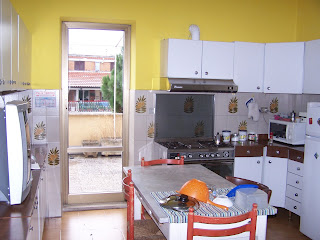Now skip forward to 2010, you and your white, Canadian wife are featured in a Canadian magazine in full glossy color.....this is an amazing world we live in. A big thank you to The Halifax Magazine and author Chad Lucas for a beautiful story that will make everyone smile.
------------------------------------------------------------------------------------------------------
Featured in the November issue of The Halifax Magazine, on store shelves now.
Across the sea
By Chad Lucas | Oct 29, 2010Catherine Robar is 32 years old, technically unemployed and recently moved back to her teenage bedroom in Clayton Park. Sounds like a familiar tale in a floundering economy—but this is not that story.
This story is about a woman who has made big sacrifices to help others through the Themba Development Project, a charity she started from scratch to feed hungry South Africans an ocean away.
It began with a conversation with a gardener.
It was 2008, and Robar was in George, South Africa. She’d visited Tanzania, Kenya and Zanzibar years earlier and was dying to return to Africa, so she joined a friend on a volunteer gig. But the work wasn’t what she expected. As she sat outside one day, bored, she struck up a conversation with a worker nearby.
One lunchtime chat led to another, and Robar invited herself to Gcinisizwe’s community. He was skeptical. “No white people ever went to Thembalethu,” Robar said.
She found his six-by-eight shack packed with two dozen people, curious to see if this mysterious Canadian was going to show. As she pulled up, people applauded and burst into song. “I felt like Angelina Jolie, without the money,” Robar said.
When she departed a few weeks later, she knew she wasn’t saying goodbye. She’d found more than new friends in Thembalethu, or even a “cause.” She had found home.
“All my life I’d felt out of place, like I’d been born in the wrong country,” Robar said. “I remember being three or four years old, flipping through National Geographic magazines and thinking, ‘I want to live there.’ In South Africa I realized, ‘This is it. This is the place for me.’”
Not long after returning to Halifax in June 2008, she hit on a simple but sustainable way to help Thembalethu: with a few packets of seeds and some long-distance calls to share her green-thumb expertise, she helped start a community garden. The Themba Development Project was born.
“I noticed there were no gardens. I thought, ‘How can people who are hungry not be growing food?’ Then I realized they couldn’t even afford seeds.” – Catherine Robar
“In Thembalethu, I noticed there were no gardens,” she said. “I thought, ‘How can people who are hungry not be growing food?’ Then I realized they couldn’t even afford seeds. Poverty is such a huge problem and it’s easy to get overwhelmed, so I’ve focused on one part. People need to eat.”
Back home, the recession was taking hold and Robar was laid off from her job with a non-profit group. At a crossroads, she moved home and went back to school to equip herself for the cause. She earned her certificate in food security from Ryerson University, and she’s headed to the University of Rome in October to pursue her master’s.
Meanwhile, the rest of her energy went to the Themba Development Project. Within a year, Robar established it as a registered charity that raised more than $10,000—which goes a long way in an area where a few Canadian dollars can plant precious fruit trees and a few hundred can build a shelter far sturdier than the scrap-metal-and-tar-paper shacks many people call home.
Her work has drawn media attention: she was nominated for the 2009 Me to We Humanitarian Award, sponsored by Canadian Living and CTV, and she’s in the running for CBC’s Champions of Change, awarded later this fall.
One of Robar’s professors at Ryerson says the Themba Development Project has thrived because Robar listened to the community and helped them find solutions, rather than showing up with prepackaged answers as so many well-intentioned missions do.
“A lot of international projects go in with the attitude that ‘We are the experts,’” said Reg Noble, a food-security expert who worked in Africa for 17 years. “Catherine hasn’t done that. In a sense, she’s acted as a catalyst to energize the community to start engaging and create change for themselves.”
Thembalethu did start rallying on its own. One day Robar fielded a call from Gcinisizwe: the gardens were flourishing, but elders had been discussing how to keep youth out of trouble. They wanted to start a soccer team.
“It was a huge deal that they approached me, because they’d been beaten down for so many generations and told not to complain,” Robar said. “It showed me that change was happening.”
She raised money to buy uniforms, balls and shin guards to start a team for 18 to 22 year-olds.
When she returned to Thembalethu for a seven-month stay last December, she got to watch the team win their local championship. She also saw the players tend gardens and lead a community clean-up. “It’s become a great give-and-take relationship,” Robar said.
On this visit, she expanded the project’s work into Gcinisizwe’s home village of Nqiningana. The elders there gave her the Xhosa name “Sandise” (San-DEES-ay), which roughly translates as “the strength of the community.”
It was even harder to leave this time—especially since, on June 28, she and Gcinisizwe Noyakaza were married. They’re the first interracial couple Thembalethu has ever known.
Robar knows they’ll be in an extreme long-distance relationship for a while—but for her, it’s worth it.
“When we first met, we both had this huge sense of relief. It was like wow, we don’t have to look anymore. We found each other,” Robar says. “It was hard to leave again, but I would rather marry someone like him and leave than not have him at all. He’s just so wonderful that I feel really blessed.”








.JPG)






